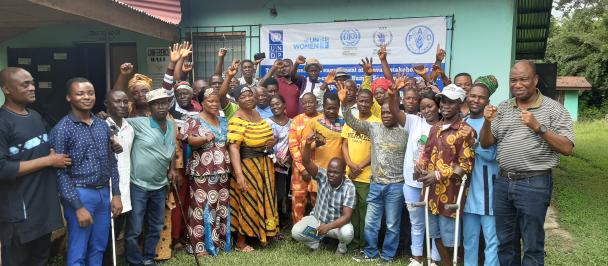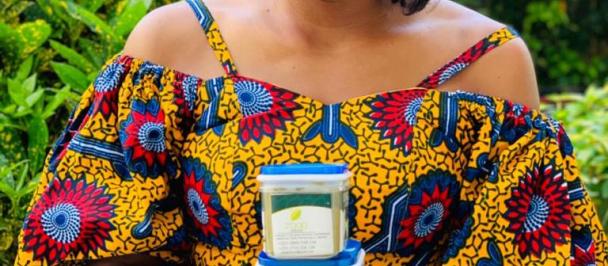Jonathan is a graduate of the Booker Washington Institute. He had the agricultural knowledge, but never knew how to plan and manage a business well.
Jonathan M. Eastman is the owner of the Goodwell Agro Business, a vegetable production farm outside Kakata in Margibi County.
He was among over 125 entrepreneurs and local service providers who were trained in customer care, record and bookkeeping, business planning, and other basic managerial skills in 2017 under the UNDP Business Opportunities through Support Services (BOSS) project.
The training was conducted in collaboration with the Ministry of Commerce and Industry (MoCI). The project coached and mentored over 200 business owners in four counties- Margibi, Bong, Nimba and Grand Bassa.
Jonathan started his business in 2016. He has blended the BOSS training with his prior agriculture knowledge to expand and improve his vegetable plot covering nearly an acre of land.
“Even though I don’t have any source of funding now, but the little money that I had prior to the training, I have been able to manage it to improve my business to where it is now,” says Jonathan.
According to him, he’s currently supplying supermarkets and marketers from Margibi, Montserrado and beyond. He intends to expand the farm to over three acres in the New Year.
"As a graduate of the Booker Washington Institute, I had the agricultural knowledge, but never knew how to plan and manage a business well,” Jonathan intimates.
The BOSS Project aims at enhancing decentralization and support to the Micro and SME policy implementation in Liberia by providing opportunities to start-up, micro and small entrepreneurs and establishment of business support infrastructure at the County level.
It works to strengthen the skills of beneficiary groups: youth, women and small agricultural producers to participate and engage in decision-making to enhance leadership, volunteerism, and community participation.
With no prior knowledge in record keeping and other basic managerial skills, Jartu Zor started fabric designs (tye and dye) business in 2012 at age, 22.
Jartu, mother of two, explains that she would generate resources and spend with no accountability on her income and expenditures.
“I used to spend money foolishly. Sometimes on things I had no business buying, only because the money was in my hands and I had control over how to spend it, with no plan,” says Jartu.
She currently sells used clothing in Kakata and was part of the BOSS training in 2017.
Follow the training, like Jonathan and others, Jartu began applying the skills /knowledge acquired. Currently, she has put into place a record system for her business- with separate books on daily income, credit and expenditure among others.
Jartu has also improved her relationship with her customers. Jartu’s revenue has significantly grown from LRD $40,000.00 (USD $250) to over LRD$80,000.00 (USD $500 to 562.5) monthly.
Before the commencement of the training for the four pilot counties under the BOSS project, initial business needs assessments and stakeholders mapping were conducted among 57 businesses comprising about 4,000 employees/members (in cooperatives), own and run by 79% women.
Alphonso Nyamah owns and operates the World Best Business Center (WBBC) in Weala, Kakata. It is a conglomerate of businesses which includes a restaurant, petrol station, car wash, tire repair shop, money exchange bureau, as well as ice and water production center among others.
Alphonso narrates that he was ignorant to the fact that the customers were his bosses and the attention given to them would determine either the prosperity or failure of his business.
“As owner of the business, I had this feeling of authority over the customers. I along with my staff, spoke to customers harshly," says Nyamah.
According to him, the UNDP BOSS training has helped him improve in the areas of customer service and record keeping.
He says customers’ service and bookkeeping are two tools that have significantly improved the revenue of the business.
Additionally, Alphonso is also transferring the same skills and knowledge to his employees/staff by conducting training.
The overall strategy of the UNDP funded project, is consistent with the Government’s long-term National Vision, which aims to address the socio-political and economic challenges facing the nation, thereby transforming Liberia into a middle-income country.
https://www.youtube.com/watch?v=-AV05VV4SUg
https://www.youtube.com/watch?v=f_CdSUH6Lao
https://undpliberia.exposure.co/local-entrepreneurs-making-gains

 Locations
Locations
